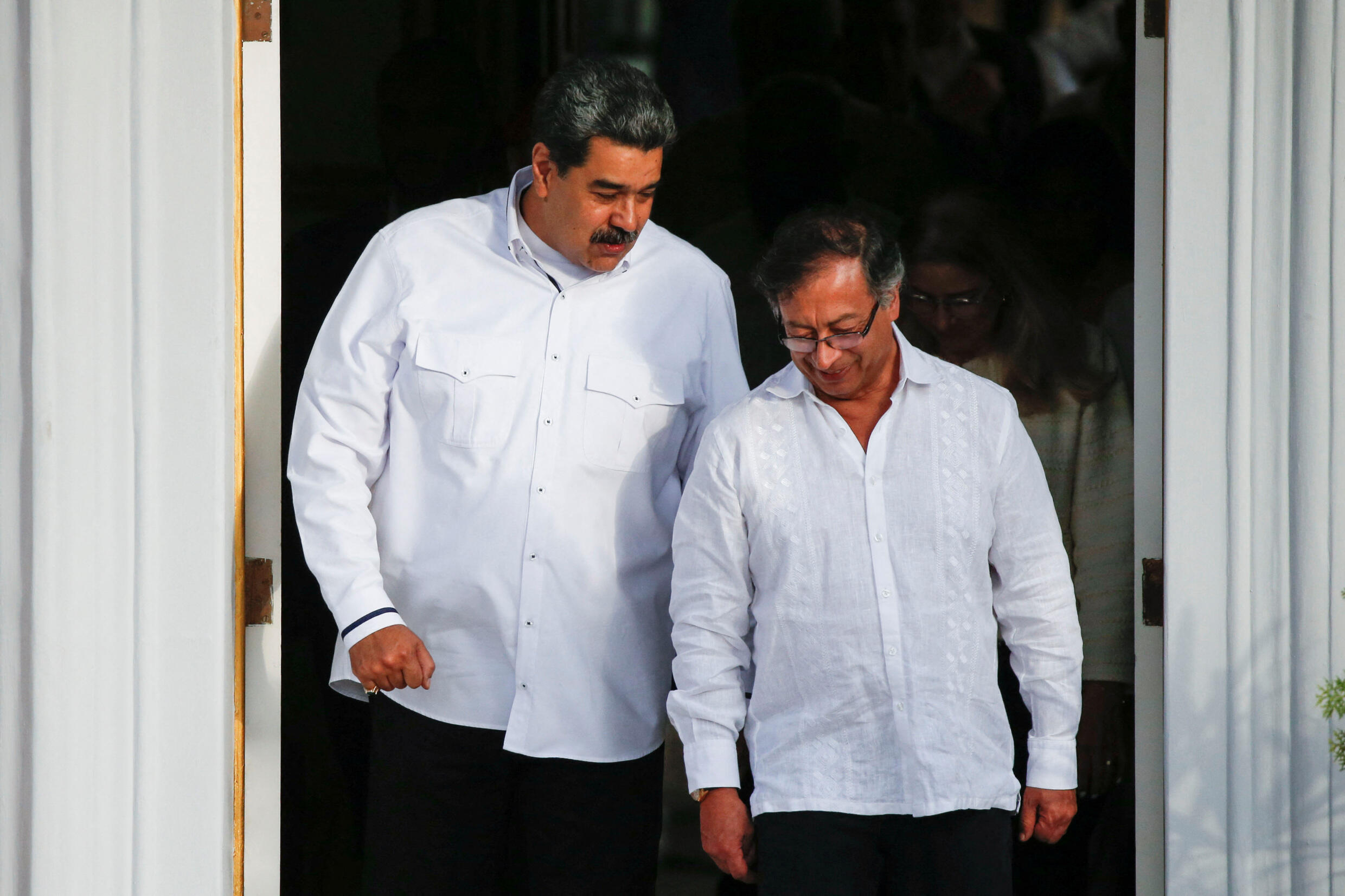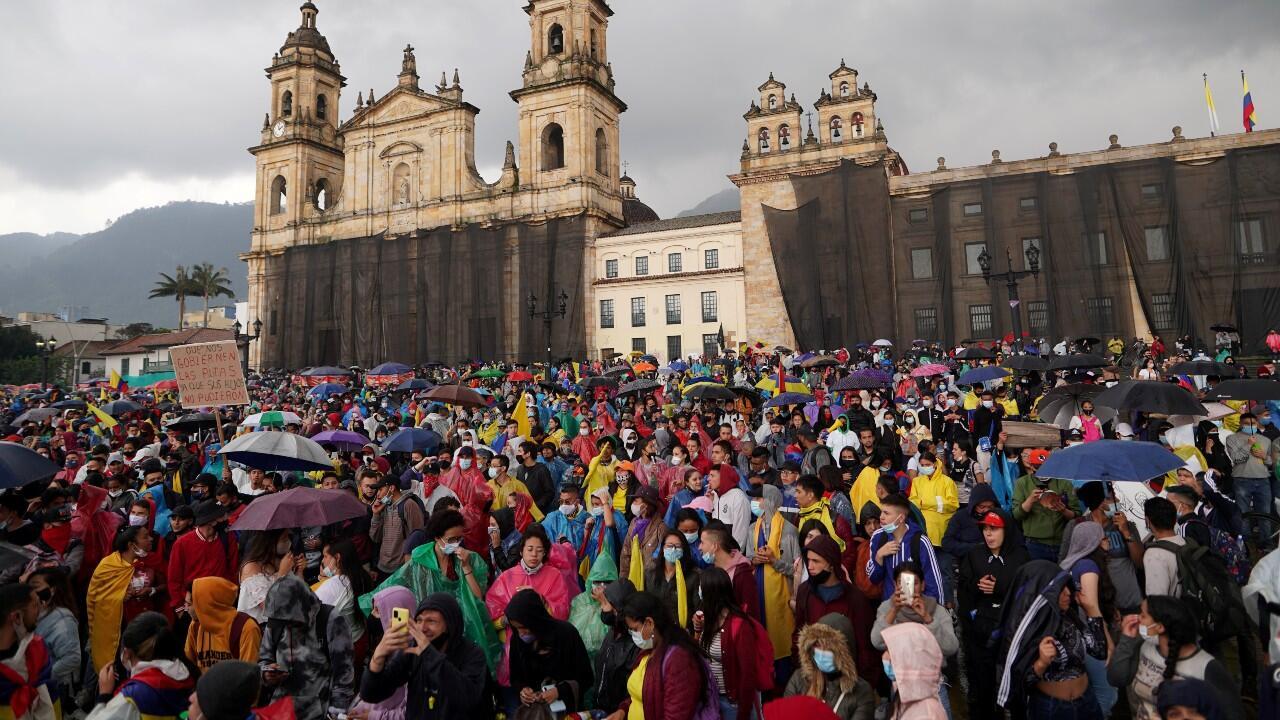Exactly one year ago, Gustavo Petro achieved an unprecedented feat in Colombia: he brought the left to power. The now president was flagged with promises of change. If the first months were marked by good dynamics with his tax reform, the last few weeks have left his government tottering, with an accumulation of scandals and the inability to advance his reforms in Congress.
Gustavo Petro was elected president a year ago with the banners of change, total peace, and greater social justice.
“From today Colombia changes, Colombia is different,” Petro said in his speech after the victory.
In the first months of his term, the president began with his “total peace” project. He resumed dialogue with the National Liberation Army (ELN), the longest active guerrilla in Colombia, and with the FARC dissidents in order to achieve a cessation of hostilities.
Shortly after taking office, Petro also resumed relations with Venezuela. The border between the two countries was reopened, the ambassadors took up their functions —Armando Benedetti in Caracas and Félix Plasencia in Bogotá—, and the Colombian president also met several times with his counterpart Nicolás Maduro.

In addition, it managed to carry out its tax reform, which plans to collect close to 20 billion pesos in the first year and finally reach 50 billion to invest in social spending. One of the main achievements of the Government.
However, as the months passed, the governance of Petro was put on the tightrope. At present, he has not been able to gather enough support to get his other reform projects through. In addition, his Administration is affected by several scandals and his “total peace” project has not had all the desired effects.
A June 2 poll by the Invamer institute reported his lowest popularity since the start of his term, with an approval of 33.8% and a disapproval of 59.4%.

“The polls say that the acceptance of Petro is low and that leaves much to be desired, since he is barely going to be in power for a year. His image has been eroded by everything that has happened in the government,” he said in an interview with EFE the former leftist senator Jorge Robledo.
This Tuesday, the Colombian opposition will take to the streets in several cities of the country to protest against the Petro government, its reforms and its recent scandals.
A stalled reformist agenda
Petro is now fighting to get his health, pension and labor reforms passed.
The health reform was presented on February 13 and although it generated a lot of controversy in the country, the president does not give it up and defends the proposal. This bIt seeks to bring medical care to the entire Colombian territory and strengthen disease prevention, among other proposals. Currently, many of the most isolated regions of the country do not have nearby medical centers and lack equipment and professionals. However, its detractors claim that it could lead to an unsustainable system.
The president lacks a legislative majority. Right now, according to an EFE count, Petro’s coalition was left without a majority in the Senate and depends on the Liberals in the House of Representatives. Last month, the Union for the People Party (known as the U Party) left the government bench and declared itself independent. An exit that followed that of the conservatives a few weeks before and that makes it even more difficult for Petro to advance his reforms.

A common criticism against the Government is its instability and the lack of direction in its decisions. Thus, since the beginning of the year, several important members of his government have left because they were not aligned with the president’s political leadership, such as the Minister of Finance, José Antonio Ocampo; the Minister of Agriculture, Cecilia López, or the Minister of the Interior, Alfonso Prada. While Petro has also opted for profound changes in his cabinet.
“The Government has to be clear where it is going and it seems that it is not clear where it is going; if the Government lurches and shows signs that one day it is going one way and another day it is going the other, what it does is feed the uncertainty, and with uncertainty, public policies become much more difficult to apply,” former President Juan Manuel Santos said on Friday at the Banking Convention held in Colombia.
Scandals close to Petro
The noise caused by the departure of the ministers was added to the noise of other dismissals. Recently, as a result of a scandal, the president removed two people from his close circle: Laura Sarabia, Petro’s former chief of staff and right-hand man, and Armando Benedetti, former Colombian ambassador in Caracas.
The former officials were touched by a case related to alleged abuse of power and illegal wiretapping.
It all started when Marelbys Meza, Sarabia’s former babysitter, was accused of robbery at her boss’s house. Then, Meza assured in an interview with the magazine ‘Semana’, that her boss had accused her of a theft of 150 million pesos (about $21,000), that she had intercepted her phone and had subjected her to a polygraph test. in the presidential headquarters itself, the Palacio de Nariño.
Then, ‘Week’ published some audios in which Benedetti threatens Sarabia with revealing details of an alleged illegal financing of the Petro campaign by 15,000 million pesos. Shortly after, the former ambassador came out to deny the information.

For his part, the president decided to fire the two politicians and denied having received illegal financing for his electoral campaign. Likewise, both Sarabia and Benedetti will be questioned by the National Electoral Council (CNE) where they will have to render accounts of the accusations.
Recently, another incident worsened the crisis. Police lieutenant colonel Óscar Dávila—assigned to the case of illegal interceptions—was found dead. It is believed to be a suicide, but the information has not been confirmed.
This scandal has put Petro’s legitimacy at risk and could make the government’s job even more difficult, as attention is focused on these cases.
“The Government is in a very difficult moment (…) Without a government coalition, since the coalition has been broken. Without presidency of the Senate since the departure of Roy Barreras. With this scandal, in addition, this considerably hinders the government’s agenda because it creates an environment that is not at all conducive to carrying out these projects,” Yann Basset, director of the democracy studies group at the Universidad del Rosario, told France. 24.
‘Total peace’, between significant and pending achievements
Petro has achieved significant progress with respect to its ‘total peace’ project, although other points of this policy have entered a deadlock.
With the ELN, the president has managed to resume negotiations and reach a historic ceasefire. The text will enter into force on August 3 and will last 180 days. The agreement was reached in Havana, where the Colombian government and representatives of the country’s longest-serving guerrilla group were in the most recent cycle of negotiations.

On the other hand, last month, the Government announced the suspension of the ceasefire with the dissidents of Iván Mordisco’s FARC. The pause in the fighting had been announced on December 31, but had to be interrupted when four minors were murdered last month in the departments of Caquetá and Amazonas at the hands of the armed group.
Finally, the truce concluded with the Clan del Golfo, the largest drug trafficking gang in Colombia, was also canceled by the president in March, when he denounced intimidation and attacks against residents in the northwest of the country.
Petro still has three years in power, a period in which he will have to break the deadlock to carry out the reforms his supporters hope for and which were instrumental in making him Colombia’s first leftist president.
With EFE and local media














